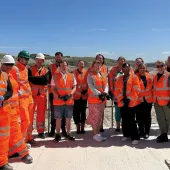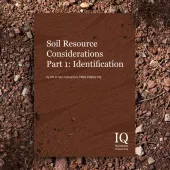Innovation - The key to the UK's infrastructure challenges

First published in the April 2018 issue of Quarry Management as Innovation – Leader or Follower?
Innovation is key to delivering the UK's current and future infrastructure challenges, but it will require a total rethink of the skills required for the sector, says IQ
A quick review of the annual reports of the top FTSE 100 companies and there is one buzzword that appears over and over again – Innovation. Whether it is a company value or a brand expression, innovation is everywhere.
What is telling is that of the FTSE 100 companies listed in 1984, only 24 remained operating in 2012. So, is innovation an unattainable aspiration? Or is it an overused expression that describes the everyday? What defines true innovation?
The Institute of Quarrying’s ‘Innovation Management’ Skills Wheel Fact Sheet describes innovation as ‘the introduction of an idea that is new to the world, or simply new to the organization, that is successfully leveraged to deliver value’. What is clear is that innovation is essential to organizational progress and sustainable competitive advantage. That applies in equal measure to small, local independent mineral extractives businesses and large, multinational conglomerates.
James Thorne, chief executive officer of the Institute of Quarrying (IQ), says: ‘There is no one single route to successful innovation. Investing in a supportive environment and culture enables organizations to capitalize on innovation from many different sources.’
Innovation has been widely adopted across the mineral extractives sector. It is embedded in business strategy and business models, and applied to new products and processes. Martin Riley, senior vice-president for Tarmac, said: ‘Innovation within the construction materials and quarrying sector is key to delivering the UK’s current and future infrastructure challenges. Every project starts with this sector, and Tarmac’s approach is to explore and focus on customer-focused innovations that have a direct benefit to infrastructure delivery.
‘We’re not only concentrating on leading the field in technological innovations such as artificial intelligence (AI), off-site manufacture and automated construction, but also on processes and behavioural changes – not simply within our own business but also in the way we collaborate with our customers and wider supply chain. We have proven on multiple projects of national significance that closer supply chain collaboration helps challenge the status quo and enables us to unlock tangible benefits in terms of efficiency, safety and innovation.
‘Tarmac have recently launched an innovation challenge to encourage collaboration among our supply chain partners to share ideas that deliver better client and customer outcomes. We apply this collaborative approach to our employees, supporting them to share and evolve innovation best practice as part of our investment in their career development, which in turn enables them to engage in shaping the future of our business.’
In January Aggregate Industries launched their 2018 Innovation Strategy. The key areas of focus include Robotics and AI, Virtual and Augmented Reality (VR & AR), Digital Engineering, Smart Materials, Offsite Construction and Blockchain.
Aggregate Industries’ chief executive officer, François Pétry, commented: ‘We chose to focus our energies on these innovations due to their potential to positively impact our
In the independent sector, Cornwall-based Delabole Slate show how incremental innovation can provide long-term benefits. Levi Hamilton, a director at Delabole Slate, explains: ‘Innovation has many faces. It’s often about creating opportunities and enabling your teams to question and experiment. But we also learn from the experience and innovation of others; for example, adopting a special sawing process originally developed for cutting marble in Italy that saves time and improves safety. It’s just one small example but reflects how we’re always on the lookout for new and better ways of doing things.’
Like many industries, the speed of technological change is transforming the way the mineral extractives sector operates. The pace with which technical and technological innovations are being trialled, adopted and rolled out continues to gather momentum. Drone technology, 3D printing, digital monitoring and surveying, as well as the rising tide of automated production and robotics, mean the skills required for tomorrow’s quarry operatives are changing equally quickly.
Just as manufacturing has seen a shift from 80% unskilled jobs just 30 years ago to 12% today, the next decade will see a shakeout of unskilled jobs in nearly every industry. In the US, 65% of today’s schoolchildren will eventually be employed in jobs that have yet to be created, according to a US Department of Labor report. As Levi Hamilton says: ‘That’s innovation with the handbrake firmly off.’
James Thorne is convinced that the adoption of many innovations will require a total rethink of the skills required for the sector: ‘Drones are now used as a routine part of quarry operations. By making drone data both accurate and easy to use, quarry staff can use drones to improve a wide range of operations. They provide valuable intelligence on stockpiles, site planning and building, drilling and blasting, road monitoring, inspections and safety.
‘The challenge is interpreting this data. It requires skills that are not commonly associated with working in a quarry. That presents fantastic opportunities to repackage how our industry is perceived – from a sector associated with low-skilled manual labour to high-skilled, technologically advanced production.
‘The same applies to the disruptive potential of 3D printing. It won’t be long before we see spare parts printed on site, saving time and cost. As for the skills required, tomorrow’s quarry operatives will ideally need to master the software-programming skills on which 3D printing rests.’
The current IQ Academy ‘Lunch and Learn’ webinar schedule also demonstrates how the Institute is innovating to add value to members and extend its reach. Sarah Fry, IQ’s business development and communications manager, sees the use of new technologies as key to unlocking the value inherent in membership of IQ: ‘Our webinar programme has been incredibly well received. People are so busy these days, it just shows that connecting with members in a way that suits them can drive participation and engagement.
‘However, IQ can offer members so much more when it comes to providing an environment where innovative ideas can be discussed. Branch networks bring together professionals to share experiences and practices; our education partnership with the University of Derby means close links with academia where theories can be challenged and debated; and close ties with our international affiliate offices means that we can distribute the latest thinking from around the world.’
James Thorne concludes: ‘Innovation can be incremental – improvements to existing products, services or processes; it can be modular, with changes to components or concepts in a system; it can be architectural, where changes to the linkages between components are impacted; and it can be radical, encompassing transformation that has a deep and wide effect.
‘So, it’s not just R&D, product design or lean improvement. Innovation is all of these and so much more. It’s not a finite step. The best organizations develop innovation skills and keep doing it to maintain their lead. As Apple’s Steve Jobs said, innovation distinguishes between a leader and a follower.’
- Subscribe to Quarry Management, the monthly journal for the mineral products industry, to read articles before they appear on Agg-Net.com








